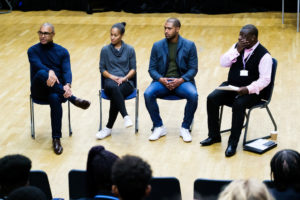Football is the “People’s Game”, played across the world by people from all nations, of all backgrounds and cultures. It truly is the universal language – from the Champions League to “jumpers for goalposts”.
However, we are well aware that challenges remain if we are to eradicate discrimination in all sport and make everyone feel able to participate fully regardless of race, gender, heritage, sexuality or any other personal characteristic.
Black History Month is an opportunity to take time to reflect on the contribution that people of BAME heritage have made to the national game in this country. Since Viv Anderson became the first black footballer to represent England in a full international, there have been 92 others who have had the honour of playing for the “3 Lions”. Nowadays, we might take this for granted but it was certainly not always so – indeed, not that long ago things were very different. Players such as Clyde Best at West Ham and the famous West Bromwich Albion trio of Cyrille Regis, Lawrie Cunningham and Brendon Batson faced overt levels of racism and were in the vanguard of changing hearts and minds.
Whilst we know that there is still much to do at every level of the game to eradicate all forms of discrimination, there is still a place to celebrate what has been achieved – whilst reflecting on what remains to be done to promote diversity within the game.

Photo: Joanne Davidson for The FA
To mark the end of Black History Month 2019, the FA, in partnership with Middlesex FA, Brent Schools FA and the Wembley National Stadium Trust, arranged a surprise visit to Capital City Academy in Willesden (not far from the stadium itself) by three great BAME ambassadors of the game – England internationals Glen Johnson and Rachel Yankey, together with Chelsea, Celtic and Charlton legend Paul Elliott.

Photo: Joanne Davidson for The FA
After a coaching session taken by Middlesex FA staff, the three footballing heroes took part in a Q&A session with the students, compared by Capital City’s chair of governors, former Spurs star Garth Crooks. In particular, they focused on the challenges and racism they faced in previous decades as players of colour and how they built their own careers in the face of discrimination from various quarters. The students were also encouraged to build their own self-confidence and to strive to achieve their personal goals and ambitions.
The event at Capital City also co-incided with the preparations for the England Men’s 1,000th international match – to be played at Wembley against Montenegro on 14th November. That, in itself, will be a celebration of football history and a reflection on the diverse, multi-racial, composition of today’s England squad.
